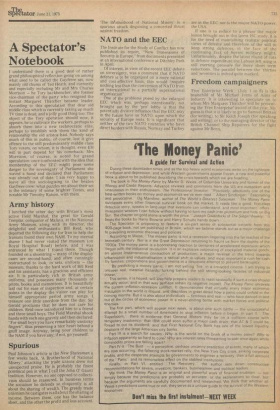'The Money Panic'
A guide for Survival and Action
During these doomlatien times and as the top heavy world economies teeter on the tightrope of inflation and depression, and while Western governments appear frozen, a new and powerful book is about to be published describing the crisis towards which we are heading.
The book is The Money Panic by Martin D. Weiss, of Columbia University and former of the Money and Credit Reports. Advance reviews and comments from the US are outspoken and unanimous in their enthusiasm. The Professional Investor: "Positively, absolutely one of the best-written books on money and economics we've ever read." Albert Sindlinger "Fascinating and provocative." Og Mandino, author of The World's Greatest Salesman: "The Money Panic outclasses every, other financial survival book on the market. It reads like a good. first-class detective story, speaks in language that everyone can understand, and most important, offers investment wisdom I can follow without having to turn my cash into plutonium and hide on Big Sur. The chapter orugold alone is worth the price.'" Joseph Gwazdecki of The Siegel Weekly: -It beats the books by Harry Browne and Harry Schultz hands down."
The Spectator is proposing to feature a six-part series of substantial extracts from this 400-page book; not yet published in Britain, which we believe stands out as a major challenge to prevailing economic theories and policies.
According to Weiss, -"The money panic is not a recession lingering into the far reaches of the twentieth century. Nor is it the Great Depression returning to haunt us from the depths of the 1930s. The money panic is a.boomerang reaction to centuries of accelerated expansion which began with the industrial revolution. It is an explosive outpouring of stockpiled material goods: an almost instantaneous contraction of production; a major reversal in the trend towards urbanisation and industrialisation; a radical shift in values; and most important .a rush for cash by families, corporations and governments in a desperate attempt to prevent bankruptcy. "By predicting a money panic, I am not yelling "fire' in a crowded cinema. I am trying to uncover real, material hazards, lurking behind the still strong-looking facades of industrial power.
This series, it is hoped, will also help prepare readers to react rationally if such a crisis should actually occur; and in that way perhaps soften its negative impact. The Money Panic unravels
the current inflation-recession conflict. It demonstrates that virtually every major economic institution in the world is illiquid, and describes in .great detail how a panic could unfold in the coming months. But it is also about individuals — fictitious and real — who have danced in and out of the circles of economic power in a never-ending battle with market forces and political enemies.
The first part, which will appear next week, is about one such battle — the unsuccessful attempt by a small number of Americans to stop inflation before it began. In part 11, "The
Superboom," there is evidence that General Motors may be on a collision course with temporary insolvency; that IBM could soon suffer a major cash drain; that AT & T could be forced to cut its dividend; and that First National City Bank has one of the lowest liquidity positions of the large American city banks.
Part III is a search for causes.. Why is the world on the brink of a money panic? Why is inflation apparently so hard to cure? Why are interest rates threatening to soar once again while commodity prices are falling apart?.
.Part IV is "The Bust'' — a perceptive, perhaps uncanny prediction of events, many of which are now occurring; the faltering stock-market rally, the New York City crisis, sinking corporate profits, and the desperate attempts by governments to engineer a recovery; then a full account of the "Panic" and its remorseless effect on the stablest institutions.
Finally, in Part VI, entitled. "The Recovery," the author sets down constructive recommendations for savers, investors, bankers, businessmen and political leaders.
We think The Money Panic is an original and powerful work of financial erudition. — not simply because the predictions are probably so accurate, or the explanations so clear, but because the arguments are carefully documented and researched. We think that whether all Weiss's predictions come true or not, they serve as a unique guide to the survival of the Western eConomies.
Don't miss the first instalment—NEXT WEEK


































 Previous page
Previous page